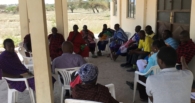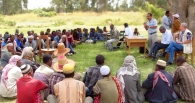Climate change and land grabbing
Robin Palmer
27 September 2019
/
- 0 Comments
Every week I receive an email from the pressure group GRAIN offering updates on the global land grab and the varied responses to it. From time to time I forward some of these to Zoe Millington to be posted on Mokoro’s Land Rights in Africa website.
I found it really striking that in the week which witnessed the quite extraordinary protests about climate change by young people across the world (20 September) my update from GRAIN included stories such as:
Villagers displaced by Neumann Kaffee’s plantations face another land grab in Mubende, Uganda
(28 villagers from Mubende district in Uganda have been illegally detained, arraigned and remanded without trial in prisons outside their jurisdiction for the grabbing of their lands).
Land conflict between villagers and PHC-Feronia in Lokutu, DR Congo: Violent arrest of many community leaders
(Police have arrested numerous villagers from communities involved in an international mediation process regarding the occupation of their land by the Canadian palm oil company Feronia Inc).
Why Ethiopia’s showcase sugar projects face huge challenges
(There can be no denying that the Kuraz sugar plantation project has so far failed on its “development promises” made to the indigenous local communities).
Help stop the advance of oil palm plantations in Gabon!
(WRM invite organizations, groups, networks and movements to sign this petition in solidarity with Gabonese communities threatened by OLAM/SOTRADER plantations by 19 September 2019).
Cameroon: Nyete community express concerns over new palm oil project, say other industries haven’t developed their lands as promised
(The community of Nyete, in the Ocean District of the South region have expressed concerns over a new palm oil project which will occupy over 30000 hectares of their land).
Landgrabbing: Contested meanings of land
(A critical examination of the European Union’s involvement in land grabbing).
When I read through these stories they revealed an extremely bleak picture of inequality, injustice, brutality and corruption – as well as the relationship with climate change, reminding me of all those young people now fighting to save our world.
For example, in Gabon people spoke of ‘the precarious situation in which we find ourselves. The forests and biodiversity – which are central to our traditional values, from where we obtain our essential economic and cultural resources, but to which we now have limited access – are literally destroyed, which may aggravate climate change-related impacts.’
In Ethiopia ‘sugarcane is a water-intensive crop. That increases the challenges for sustainable development. This is largely neglected in the official debates on the industry’s future trajectories. Chances are high that agricultural run-off, and effluent – liquid waste or sewage – from processing will seriously affect complex water systems. Agricultural run-off could include water from fields that contain fertilisers, pesticides, animal waste, or soil particles which enters and contaminates drinking water. From now on, the success of the sugar industry will be measured not only in economic terms but in how environmental and social costs will be reduced.’
In the DRC, the environmental pressure group RIAO-RDC was mandated ‘to file a complaint with the DEG (German development bank) so that ultimately the Congolese communities could have their claims against this Canadian company heard at the international and national level.’
In Cameroon, ‘the area to be exploited by CAMVERT Sarl is currently home to a varied species of wildlife, and it is feared that with trees cut down, these animals will be forced to look for new habitat and some might die on the way. Civil Society Organisations dealing with the environment and maintenance of wildlife species indicate that animals such as elephants, buffaloes, great apes live within these 60,000 hectares of land, which also harbours rich flora such as rare semiaquatic species. They are also worried about the increase in land pressure and the fact that the decision undermines Cameroon’s commitment to the process of promoting sustainability in certain agricultural value chains gearing towards deforestation.’
In a thoroughly depressing report on land grabbing by TNI’s Sylvia Kay, she argues that ‘The role of the European Union (EU) in landgrabbing is manifold. EU actors are involved in the financing of large-scale land deals worldwide. This occurs through forms of private finance, public finance and increasingly through a combination of both in the shape of public-private partnerships, multi-stakeholder initiatives, and other forms of blended finance.
What is particularly worth highlighting is how the EU’s position as an agricultural powerhouse is also dependent on the huge import of agricultural commodities and inputs from the global South. Europe has a vast ‘land import dependency’ with nearly 60% of the land used to meet Europe’s demand for agricultural and forestry products coming from outside its borders. These vast flows of animal feedstocks (soybeans and soymeal) being imported into the EU have significant implications for land use in exporting countries, principally in South America, as vast tracts of land are given over to soy monocultures.
The boom of the EU’s bioeconomy touches on many interrelated dimensions of the EU’s policies on growth, climate, and energy. At its heart, is a vision of a new economy based on the increasing use of biotechnologies and agrofuels in order to respond to growing concerns about the unsustainable use and management of finite natural resources, especially fossil fuels. This involves the conversion, through technical processes, of food and non-food agricultural crops, into sources of bio-based energy, plastics and chemicals, to be used for a variety of agricultural, industrial, transport, waste recycling, and environmental technology purposes.
Specifically, when it comes to land governance, this regime:
- hinders necessary and important land redistribution and restitution programmes;
- locks in onerous land deals;
- fosters land commodification;
- disempowers local legal resistance;
- impedes the reversal of abuses of illegitimate and unjust land (and water) deals;
- limits the scope of progressive agrarian and agricultural policies that protect small-scale farmers and public health.
By supporting this global investment regime, the EU seriously undermines efforts to stop and roll back landgrabbing, thereby legalising the illegitimate.’
These are certainly extremely grim times, as the above examples illustrate only too well, not to mention Bolsonaro encouraging the burning of ‘his’ Amazon and declaring war on the MST (Landless Workers Movement). Yet the protests of young people across the world about how we, the old folks, are messing up our planet reminded me, yet again, of the necessity of continued engagement at all levels – and all ages.
So, as we used to say during the struggle for the liberation of Southern Africa, a luta continua – the struggle continues. Indeed it does, as I told my oldest grandchild as she set out on her university career this month.



